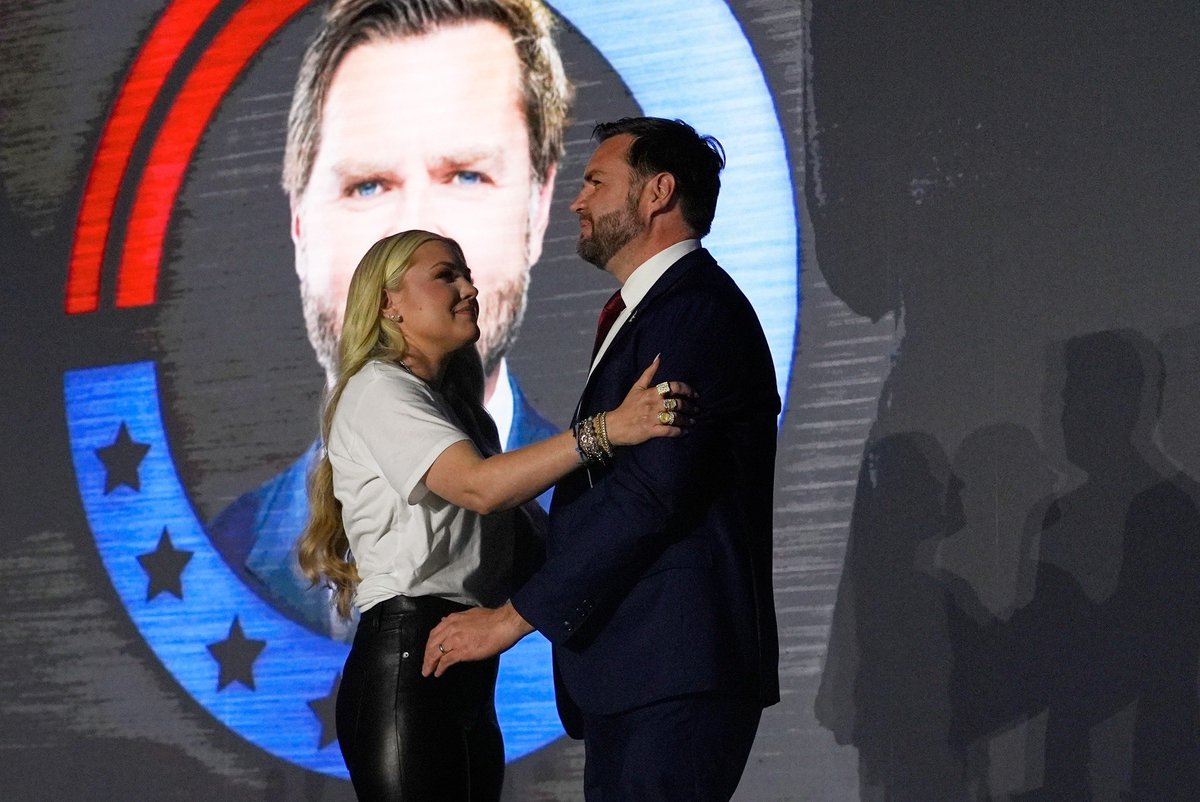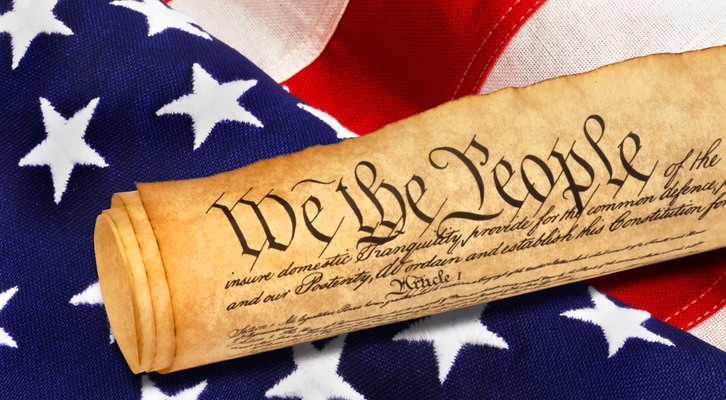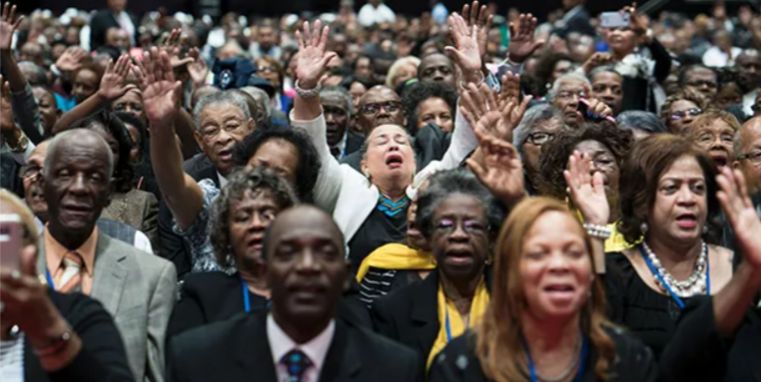(ThyBlackMan.com) In American politics, a single image can shift the narrative of a man’s career. One photograph — one gesture — can eclipse months of speeches and policies, transforming substance into scandal. Such is the case with Vice President JD Vance and Erika Kirk, the widow of conservative firebrand Charlie Kirk. The two shared what might have been, in another context, an ordinary hug — but in the white-hot theater of twenty-first-century politics, that hug has become something else entirely. It is a Rorschach test for morality, faith, power, and perception. It has become the newest chapter in the strange saga of a man whose populist rise was built on working-class virtue, yet now faces questions about propriety, faith, and the fragile art of appearances.
On a brisk Wednesday night at the University of Mississippi, Turning Point USA hosted its “This Is the Turning Point” tour, a campus event that sought to rally conservative students under the same flag that once waved proudly under Charlie Kirk’s command. Since his passing, his widow, Erika Kirk, has taken over the organization — a symbol of continuity and legacy. But when Vice President JD Vance arrived as the headlining guest, filling the slot once reserved for Charlie himself, history, grief, and politics collided onstage. What happened next — a close embrace, caught by cameras — has now become one of those indelible cultural moments that tell us less about what happened and more about what America chooses to see.
The image speaks for itself: Vance, with his hands around Erika’s waist, and Erika, leaning in — her expression suspended between sorrow, surprise, and something intimate that words can’t quite name. To some, it was compassion — a man comforting a grieving widow in the public square. To others, it was far more ambiguous, even inappropriate. The human body doesn’t always follow the political script. His hand placement, the distance between their faces, the lingering quality of that hug — it was all too cinematic, too charged for a nation addicted to speculation.

And the timing couldn’t have been worse. For Vance, already navigating a delicate balance between political ambition and moral conservatism, the hug struck a chord that even his most loyal defenders struggled to defend. In another age, this might have been dismissed as gossip. But in the age of social media — where outrage becomes identity and imagery becomes politics — every frame of that hug has been slowed down, scrutinized, and reposted a million times.
It wasn’t just that Vance hugged Erika Kirk. It was that, on the same stage, he spoke openly about his wife, Usha — and about his wish that she would convert from her Hindu faith to Christianity. The comment, which may have seemed like a moment of religious sincerity to some, now plays differently in light of the imagery that accompanied it. “I honestly do wish that because I believe in the Christian gospel, and I hope eventually, my wife comes to see it the same way,” Vance told the audience. “If she doesn’t, then God says, everybody has free will, so that doesn’t cause a problem for me.”
The juxtaposition was staggering. A man of public virtue embracing another man’s widow, while expressing a wish for his own wife’s spiritual transformation, has ignited debates about faith, fidelity, and the optics of piety. Usha Vance — a brilliant lawyer, mother of three, and daughter of Indian immigrants — has always been the quiet force behind her husband’s political ascent. But as the photos from Mississippi spread across the internet, sympathy began to shift toward her. Was this fair to her? Was the Vice President’s body language reflective of empathy, or something less disciplined — an emotional lapse that borders on recklessness?
In modern politics, optics are the oxygen of survival. Vance, known for his intellectual intensity and blue-collar narrative — from “Hillbilly Elegy” author to Vice President — has built a brand on authenticity and family values. His story was meant to be about redemption: the Appalachian boy who rose above chaos, married across cultures, and embraced Christian conservatism. Yet the hug with Erika Kirk, seen through the merciless lens of social media, threatens to puncture that myth. It’s not the act itself that endangers him, but the symbolism. Americans, especially conservative Americans, are unforgiving when it comes to the appearance of moral contradiction.
The historian must pause here, not to pass judgment, but to trace the parallels. Power and scandal are old dance partners in American history. From Thomas Jefferson’s whispers about Sally Hemings to Bill Clinton’s infamous denials, the nation has always obsessed over the private lives of its leaders — not merely out of curiosity, but because we believe personal morality reflects public trustworthiness. In Vance’s case, the hug becomes a cipher. It asks whether the man who preaches about faith and family can navigate the intimacy of politics without crossing unseen boundaries.
And what of Erika Kirk? Her presence complicates the narrative. As the widow of one of the most polarizing conservative figures of the last decade, she embodies both reverence and resilience. Charlie Kirk built a brand on provocation, on culture wars, and on youthful defiance. Erika, in inheriting his platform, walks a tightrope between tribute and reinvention. Her appearance with the Vice President was supposed to mark a new chapter for Turning Point USA — one that merges faith with female leadership. Instead, she’s been thrust into a maelstrom of commentary she never asked for. Some view her as complicit in the optics; others see her as an unintentional casualty of emotional vulnerability. To mourn publicly is to risk misinterpretation. Yet history tells us that widows of powerful men have often been used as mirrors for male projection — symbols of loss, temptation, or redemption.
That night in Mississippi, as the crowd cheered and cameras flashed, the air seemed charged not just with ideology but with theater. Vance had been playing the part of Charlie Kirk’s intellectual successor — debating students, delivering sharp cultural critiques, and blending populist rhetoric with evangelical overtones. His embrace of Erika was, perhaps, an attempt to bridge grief and continuity. But the human gesture, in its warmth, broke the choreography. It became too human — too real — for a public that expects its politicians to emote on cue and freeze afterward.
When Vance placed his hands on Erika’s waist, it wasn’t just a hug; it was an image of proximity between power and vulnerability. It reminded America of how thin the line can be between compassion and controversy. Every political scandal begins with a moment that felt natural to those inside it and unnatural to everyone watching.
For Usha Vance, the implications are profound. Married into a world that often questions her faith, her heritage, and now her husband’s loyalty to image, she faces the dual burden of representation and scrutiny. She is not just the Vice President’s wife — she is a symbol of multicultural America, a woman of Hindu background raising children in a Christian household under the gaze of a nation that still struggles with the concept of dual identity. When her husband expresses hope she’ll “come to see” Christianity as truth, it touches nerves far deeper than marital persuasion. It invokes the old American anxiety about assimilation — the idea that love must conform to faith to be whole.
And so, when the cameras captured Vance’s embrace with another woman, it was not only marital optics that fractured. It was the fragile equilibrium between personal faith and public image. Could a man who speaks of conversion and moral order afford to appear morally ambiguous, even for a heartbeat?
The historian notes that political power amplifies every gesture. The hug between Vance and Erika Kirk would have meant nothing in private life. But when performed on a public stage, under the lights of Mississippi, it became performance art — open to interpretation, distortion, and political weaponization. Conservative commentators defended it as empathy; liberal voices mocked it as hypocrisy. Online, memes sprouted faster than official statements. And through it all, Vance remained silent, offering no apology, no clarification — perhaps believing that explanation would dignify rumor.
Yet silence, too, speaks. In the theater of scandal, refusing to engage can feel like contempt. Should a sitting Vice President publicly apologize to his wife for what many interpret as impropriety? Perhaps not for the hug itself, but for its carelessness — for forgetting that every move of a leader is no longer personal. In a world saturated with cameras, the moral weight of optics has replaced the moral weight of action.
Vance’s defenders argue that the outrage reveals the pettiness of modern politics — that a compassionate gesture toward a grieving widow has been twisted by cynicism. There is truth to that. America’s obsession with scandal has often destroyed empathy. But even compassion, when performed by power, must obey the choreography of restraint. Presidents and vice presidents are not free to feel as ordinary men do. Their gestures are not theirs alone; they belong to the institution they serve.
If there is one lesson history teaches us, it’s that scandal isn’t always about guilt — it’s about tone. The same act that redeems one man can ruin another depending on context. Franklin Roosevelt’s fireside intimacy was celebrated; Bill Clinton’s was condemned. In Vance’s case, the contradiction between his moral sermon and his visible warmth toward another woman creates dissonance. Politics, after all, is built on performance, and the audience decides the meaning of every scene.
As for Erika Kirk, her role is more tragic than scandalous. She is both subject and object — the widow still navigating life after her husband’s death, suddenly thrust into the same political spotlight that consumed him. For her, the hug may have been closure, comfort, or just a human reaction to shared emotion. But grief has no PR strategy. In her eyes, some see longing; in others, sorrow. What matters is that the world saw — and that seeing reshaped the story.
Usha Vance’s quiet dignity in the face of viral speculation evokes a familiar narrative in political history — the loyal spouse who becomes the silent witness to scandal. Yet unlike the wives of past political figures, Usha’s silence carries an added layer of cultural complexity. She is not simply enduring rumors; she is navigating them through the lens of race, faith, and belonging. Every headline about “conversion” becomes another reminder that her private spiritual choices have been politicized.
Whether JD Vance meant harm or not, his actions reveal the enduring tension between image and authenticity in American politics. Can a man who preaches about godly order afford to let his humanity show too vividly? Can empathy coexist with discipline when every gesture is filmed? The irony is that the same authenticity that fueled Vance’s political rise may now threaten it. He was elected for seeming real, unpolished, sincere — and yet that realness, unguarded, now feeds suspicion.
In the court of public opinion, perception is evidence enough. The internet does not wait for clarification; it manufactures meaning. The Mississippi embrace has already joined the pantheon of political images that outlived their context — like the photo of Lyndon Johnson taking the oath beside Jackie Kennedy, or George W. Bush whispering after the towers fell. But unlike those moments of crisis and leadership, this one belongs to the theater of scandal — a tableau of intimacy and speculation that says more about America’s hunger for contradiction than about the people themselves.
Still, one cannot ignore the moral expectations attached to high office. The Vice President of the United States, a heartbeat from the presidency, must not only act with integrity but appear to. That is the cruel paradox of political life: perception becomes character, and once a leader’s image cracks, the fissure never truly heals. Whether this episode fades into gossip or grows into symbol will depend on Vance’s response — and his wife’s silence.
In time, historians may look back at this as a minor cultural flare-up, a footnote in the story of a populist era that thrived on personality over policy. But the deeper significance lies in what it reveals about the state of the Republic — a nation where private emotion and public virtue are forever entangled. The hug between JD Vance and Erika Kirk is less about infidelity and more about fragility — the fragility of trust, of image, of human imperfection beneath the armor of power.
Should Americans demand a public apology? Perhaps the question is less about apology and more about accountability. Not every misstep is a sin, but every symbol shapes belief. When the Vice President of a nation built on family values embraces another man’s widow so tenderly that it ignites national debate, the issue ceases to be private. It becomes political theater — one that tests whether sincerity can survive the spectacle of suspicion.
What remains is the image: his hands on her waist, her face turned slightly toward him, the crowd frozen in the background. History will not recall the speeches of that night, nor the policy points debated. It will remember the photograph. Just as generations before remember the handshake that sealed alliances or the glance that betrayed secrets, this hug will linger — a small but telling emblem of our time, when power’s greatest weakness is not corruption but carelessness.
And so, as the dust settles, one truth endures: America does not merely elect leaders; it auditions symbols. JD Vance, once the emblem of working-class redemption, now faces the test that every man of power eventually does — the test of restraint. Whether he passes will determine not only his political survival but his moral legacy. And in the end, it may not be his words about faith that define him, but the fleeting, controversial tenderness of a single hug.
Staff Writer; L.L. McKenna
Politics explained through the lens of justice and equity. Offering perspective that informs, challenges, and empowers.
One can contact this brother at; LLMcKenna@ThyBlackMan.com.

















Leave a Reply